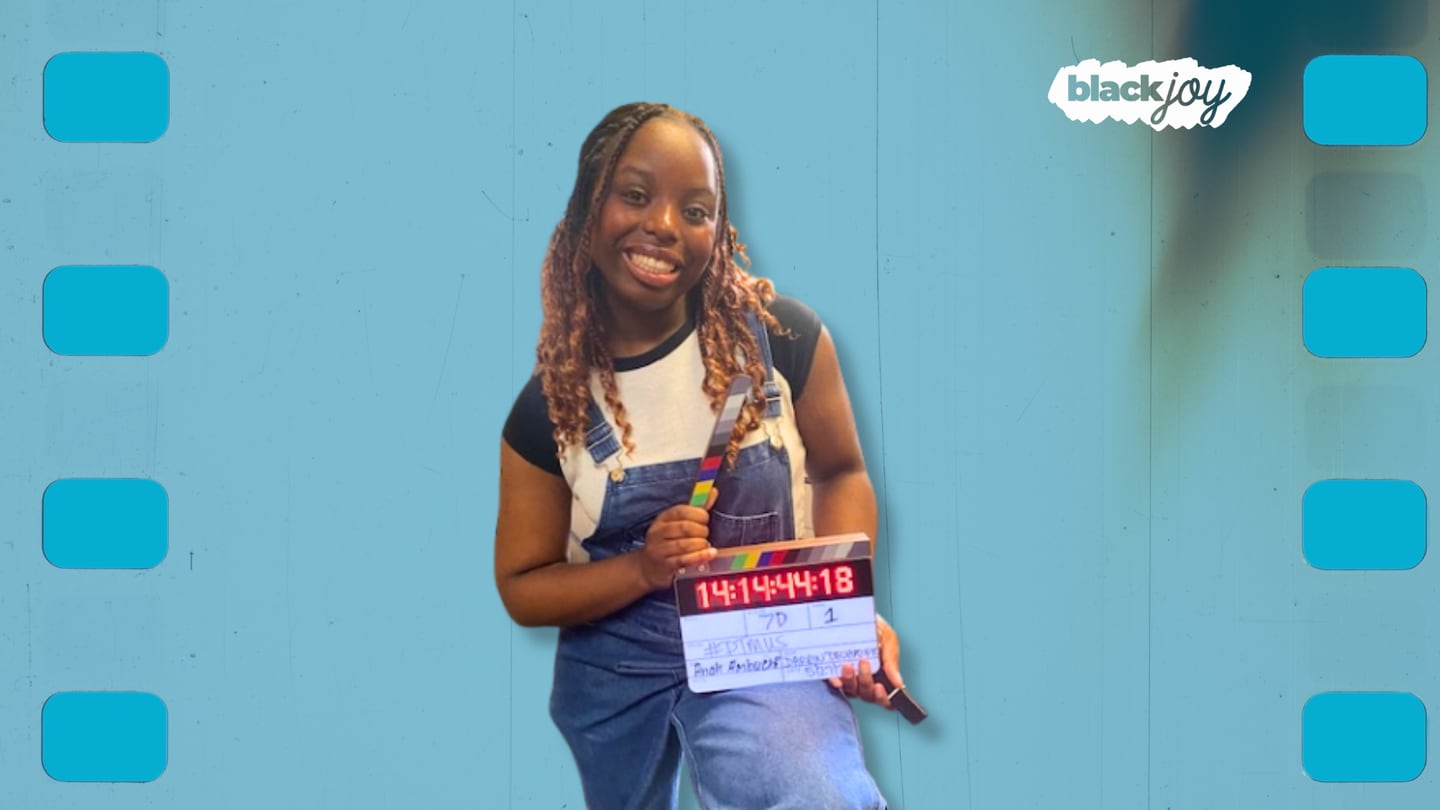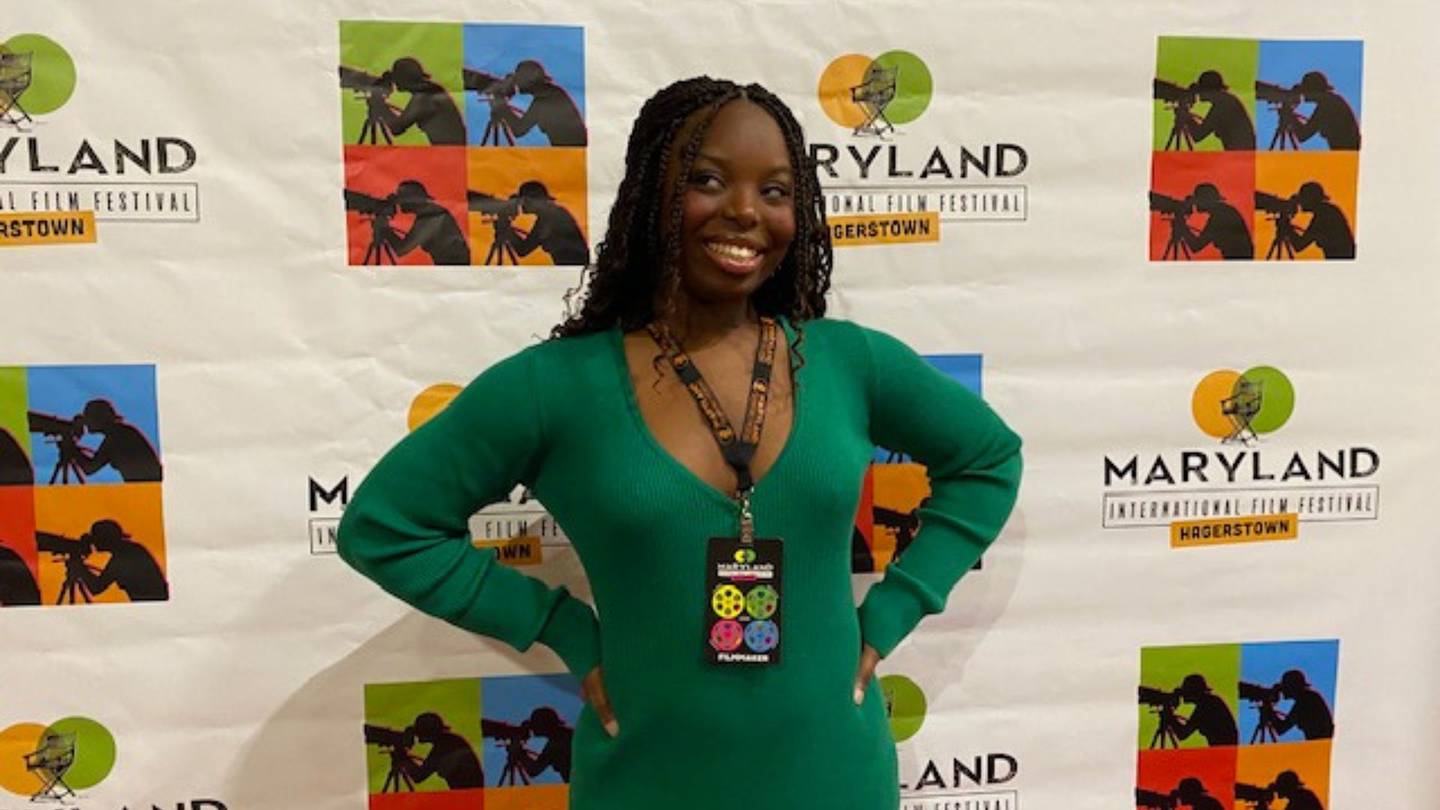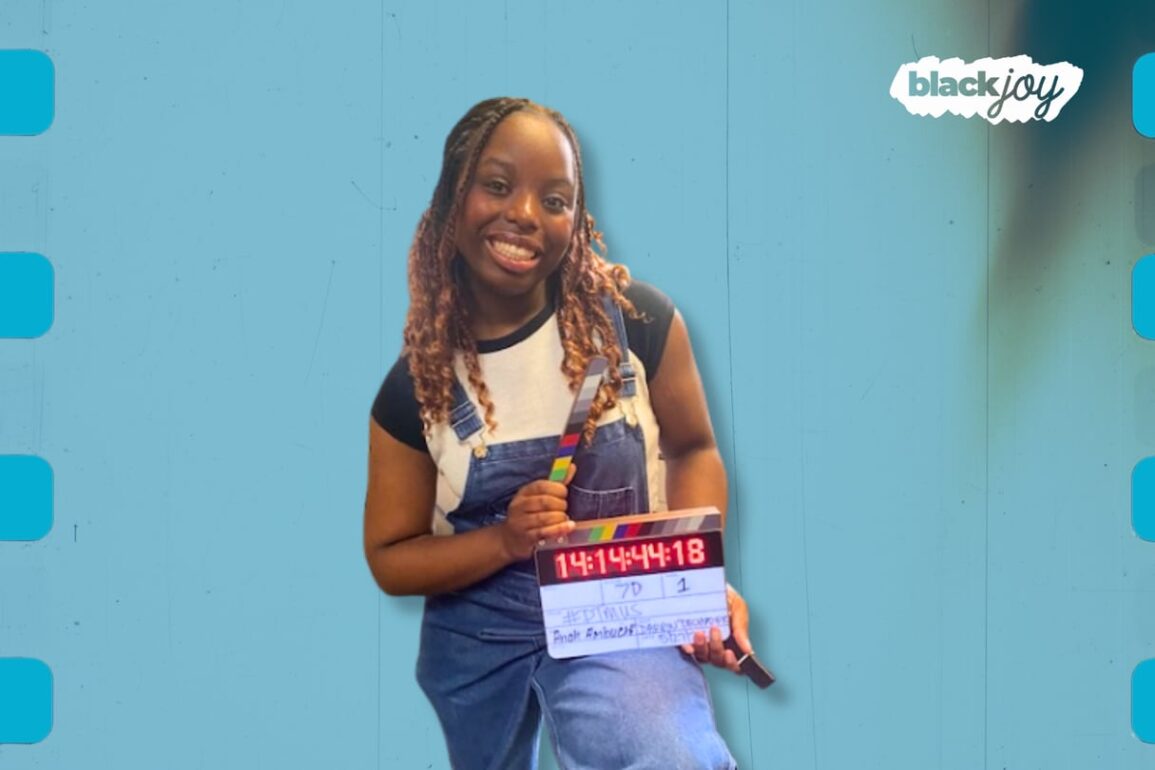
At just 17 years old, Anah Ambuchi is shaping people’s perspectives on how to better care for Black youth one short film at a time.
She was inspired by the Blackness that graced her favorite movies and shows such as “Coming to America” and the Disney sitcom “That’s So Raven.” During her elementary school years in Chicago, Ambuchi started bulking up her acting resume which currently includes both commercials and a recurring role in Showtime’s “The Chi.” By age 11, Ambuchi was pulling from her own experiences when she wrote, produced and directed “In His Image,” a short film detailing the dangers of bullying. The movie was shown at 14 film festivals nationwide and won four awards, including the Rising Star Award at Diversity in Cannes, an initiative pushing for racial inclusion at the world-renowned Cannes Film Festival in France.
I feel like seeing these types of films can engage the mind and create positive messages.
— Anah Ambuchi
While earning those accolades, Ambuchi didn’t waste any time. She was also writing, producing and acting in her latest project, “Don’t Tell Me Ur Sorry.” The 20-minute film explores the mental health of two Black teens navigating racial issues and the aftermath of the COVID-19 pandemic in different ways. The emotional wellbeing for Black teens has reached epidemic levels. Ambuchi hopes “Don’t Tell Me Ur Sorry” will encourage youth to be aware of their mental health and teaches adults to listen and address those concerns when teens speak up. Ambuchi believes film is more than just entertainment, it can be a tool that shapes people’s perspective about a topic.
“We’ve seen those statistics about suicide. We’ve seen the effects of bullying and how mental health can really be a damper on someone’s [well-]being,” Ambuchi said. “I feel like seeing these types of films can engage the mind and create positive messages. Whereas when we’re just constantly consuming our minds with things that have no meaning, then we’re not trying to better ourselves as a society.”
A thank you to the bullies
Mental health advocates have been sounding the alarm on the suicide rate among Black youth, which is increasing faster than any other race and ethnic group in the country. From 2007 to 2020, the rate rose 144 percent for Black teens between the ages of 10 to 17. Bullying can leave emotional scars that can lead to depression and anxiety. According to the Civil Rights Data Collection, Black and Brown students are more likely to experience bullying in schools – a reality that nearly traumatized Ambuchi when she was in third and fourth grade.
I can’t take credit for me coming out of my bullying without saying that my mom, my aunts and my uncles were with me every step of the way. You can never get out of anything truly alone.
— Anah Ambuchi
The Kenyan American student was perplexed when kids she’d known since kindergarten started hurling racist names at her due to her dark complexion. Soon the words turned into actions, like being shoved in the mud after her uncle bought her new shoes. Ambuchi feared the consequences of opening about the abuse to her mom and teacher. Black students are less likely to report bullying because they don’t want to be seen as “weak.”
“I didn’t want anyone to tell me that I’m just overthinking it or I’m just too sensitive,” Ambuchi said. “It was not pretty. I would just come home and I would be so mad because I could never take my anger out on my bullies. Every time I tried they would just say something back.”
So Ambuchi kept quiet about her pain and for two years she absorbed the bullies’ comments. Her self-esteem and self-worth plummeted along with her grades. She continued to book commercials, but her excitement about the accomplishments dimmed.
“Instead of me sharing all those good opportunities, I just went quiet because every time I did share, I was made to feel less than – like I didn’t deserve these opportunities,” Ambuchi said.
The simmering self-hatred reached a boiling point one night during dinner. She doesn’t know what triggered it. Her emotions just couldn’t be bottled up anymore. She started bawling to her mom about what was happening. Her mom soothed her pain by admitting that she too was bullied because of her skin tone. She gave her daughter affirmations to reclaim her power: “I am beautiful. I am special. I am significant. I am smart,” Ambuchi was required to say.
Ambuchi and her mother did inform her school’s principal and vice principal about the bullying. While a meeting with the student who was doing the majority of the harassment was discussed, Ambuchi said nothing happened. Her mother put her in a different school where the bullying was nonexistent. Despite her former school’s lack of response, Ambuchi’s village nursed her soul back to health. Family members called in to check on her wellbeing. Church members laid their hands on her and spoke prayers of encouragement. She repeated the affirmations everyday, speaking the words with more and more power each time.
At 10 years old — a year before she started writing “In His Image” — Ambuchi auditioned for American Girl Doll. She was asked what she most loved about herself. Noticing she was the only dark-skinned girl in the space, she mentioned her skin. Ambuchi said she wouldn’t have learned to love her complexion if it wasn’t for her community. “I can’t take credit for me coming out of my bullying without saying that my mom, my aunts and my uncles were with me every step of the way,” Ambuchi said. “You can never get out of anything truly alone.”
The script for “In His Image” was partly inspired by Ambuchi’s journal entries about her experience and a photo book “Dark Girls” by Bill Duke, which she found on her acting coach’s desk. She was intrigued by stories of other Black actresses she admired who went through the same journey of learning self love.
“Reading that book and seeing Lupita Nyong’o go through bullying and still be Lupita Nyong’o and all these other celebrities go through it just really sunk into me, and a film came into my mind.”
But Ambuchi didn’t see herself as a filmmaker at the time. In fact, she started contacting other directors she met in her acting career to make the film for her. But her acting coach, family members and even Bill Duke himself encouraged her to tap into her talent to share her own story and achieve dreams.
“My acting coach actually has this saying: Be fly and create,” Ambuchi said. “Meaning you don’t have to wait for anyone in Hollywood. You can do it. I thought that was always so inspiring.”
By believing in herself, Ambuchi took on the challenges of changing her role from performer to producer at only 11. She learned the artform of writing a script and reenacted her emotional odyssey of hardship and healing on screen. Her confidence grew along with her skills in the filmmaking industry. She took initiative by contacting Diversity in Cannes Founder Yolanda Brinkley for an opportunity to join the film festival’s committee. Brinkley declined due to Ambuchi’s age at the time, but Brinkley wanted to honor the child’s tenacity. Ambuchi and her family were invited to France for a special premier of “In His Image” and to receive the Rising Star Award. Ambuchi is now a youth jury member with Diversity in Cannes Short Film Showcase and the Chicago International Film Festival.
The success of her first film transformed Ambuchi into an anti-bullying and mental health advocate. She mentors and uplifts other Black youth by being involved in multiple nonprofits such as the Saving Our Daughters Organization, which was co-founded by Keke Palmer. Thinking about all these moments now makes Ambuchi realize how her success has outlived her struggles.
“I always thank my bullies,” Ambuchi said. “I’m like, ‘Thank you so much because if you would have never said all those horrible things to me, I don’t think I would have been able to find my voice. I don’t think I would have been able to find what I truly love – what I’m truly passionate for.”
Getting help is the new “strong”




Producing “Don’t Tell Me Ur Sorry” seemed like an organic and vital next step for Ambuchi considering how the events of 2020 took a toll on Black teen mental health. The legacy of medical racism made Black and Brown communities more vulnerable to COVID-19. Thus Black teens were twice as likely to lose a caregiver to the virus. They were also absorbing the racial trauma of watching the televised murders of Black people, including George Floyd, Breonna Taylor and Ahmaud Arbery. Ambuchi’s second film touches on the unpredictability of the classroom following a global shutdown and the emotional turmoil of dealing with racist, white family members.
Like “In His Image,” the script is based on Ambuchi’s life and the struggles of her peers. During the 2020-2021 school year, her family moved from Chicago to Rockville, Md. Meaning she had to adjust to a new reality during the outbreak and an unfamiliar environment.
Ambuchi was a fan of online learning during the shutdown. It gave her the ability to focus on her work in her own space without the distraction and drama of the classroom. But not every child experienced remote learning as a paradise. Mental health experts pointed out how long-term Isolation from friends and other positive aspects of school can increase emotional distress.
Ambuchi got a different perspective of online learning while talking to her best friend, who is part of the LGBTQ+ community. That friend was forced to move in with their homophobic family member after their mother passed away. Ambuchi then realized how some students see school as a safe haven from unsupportive households.
During their conversation, Ambuchi’s friend told her not to respond to their situation by saying she’s sorry. Their words eventually became the title of her second film. In the trailer for “Don’t Tell Me Ur Sorry,” one of the characters, who is dealing with a racist aunt, tells her guidance counselor that the empty apologies aren’t doing her any favors.
“‘Sorry’ has become more of an excuse,” Ambuchi said. “We’ve heard that a lot during the pandemic: ‘We’re sorry but there’s another COVID rise. We’re sorry but we may go back online again.’ Don’t tell me you’re sorry, just be there for me.”
Going back to in-person instruction was a turbulent time for Ambuchi. It was her freshman year of high school, and maintaining healthy friendships wasn’t in the handbook at her new school. Ambuchi said she often caught herself in one-sided connections, which led to frustration.
“I was the affirmation app – the one that people leaned on and cried on about their relationship issues or whatever was going on,” Ambuchi said. “But when it came to the things I needed or things that I was going through, no one was ever there for me.”
Severe anxiety and panic attacks were a common issue for Ambuchi during her sophomore year of high school. A failing grade in one of her classes compounded the stress she was already feeling about her friendships. Sensing something was off, her mother pulled her out of school for a week to take care of her mental health.
In “Don’t Tell Me Ur Sorry,” Ambuchi’s character, April, tells her counselor, “We are only strong because we are forced to be strong.”
Saying that line was Ambuchi’s way of relating her experience of being the strong friend to the psychological burden of being the “Strong Black Woman.” Since she is part of a demographic that is more likely to develop posttraumatic stress disorder than white women and twice as likely to develop major depressive disorder than Black men, Ambuchi wants Black women and girls to know they don’t have to live their lives stressed out anymore.
“Black women are silenced,” Ambuchi said. “But you don’t have to be what other people expect you to be. Yes, it’s going to catch people off guard, but be honest with yourself and be true to yourself. I think that’s what I’m learning to do: to be more open and start speaking my truth.”
Ambuchi used her time off from school to build a sanctuary within herself by attending a Christian retreat. There she added a new saying to her arsenal of affirmations: you are enough. Saying this truth helped Ambuchi unhitch her worth from her grades or how her classmates treated her.
“Sometimes we can keep saying, ‘Oh, well I’m enough,’ but lose sight of the meaning,” Ambuchi said. “It was really nice to have that refresher, to be in communion with like-minded youth, and to take care of myself and my wellbeing.”
Ambuchi understands why many teens may not be in the best space to prioritize themselves. During lockdown, she heard stories of her classmates being parentified. They took care of younger siblings while their parents worked. The juggle of finishing schoolwork while taking care of family members is a tough responsibility to bear for teens, Ambuchi said. The film touches on this issue and the fact that 10.8 percent of nonelderly Black Americans are uninsured. Meaning getting help can be a hefty price tag.
“These kids were becoming adults faster than they needed to be, and they wanted to speak to somebody, but they couldn’t afford health insurance,” Ambuchi said. “So in the film we do school counseling, but I’m hearing a lot of teens say, ‘Oh, I would love to get therapy, but I can’t afford it.’”
For other teens, Ambuchi said fear of judgment from the community can be another barrier to therapy. She believes a multigenerational approach can heal people’s perspective of therapy. Ambuchi heard a lot of complaints from her Generation Z peers about older family members making insensitive comments about their mental health. She encourages the youth to describe their experiences and be patient.
“Definitions have changed. People’s preset perspectives have changed,” Ambuchi said. “Maybe instead of shutting the elders off, or making it seem like they’re being insensitive, maybe enlighten them. Like, ‘OK, well, grandma this is what’s going on.’”
Ambuchi makes it clear that the effort shouldn’t come from one side. The elders need to reach out to the youth and be teachable.
“Instead of automatically shunning Gen Z, asking them, ‘Why do you feel this way? Help me understand your feelings,’” Ambuchi explained “We both have to be able to listen, slow down and comprehend what we are trying to say.”
Just like with “In His Image,” Ambuchi is leveraging the success of her second film to educate her community. “Don’t Say Ur Sorry” has been featured in multiple film festivals, along with Diversity in Cannes Short Film Showcase, the Urban Mental Health Film Festival and the Black Girls Rock Film Fest. She’s had a therapist at a few of these festivals to facilitate a conversation that can help people get more comfortable with asking for help.
“It can be scary to speak up, but if we just subject ourselves to always being quiet – to just take what the world hands to us we’ll never be able to move forward or get the respect that we want,” she said.



